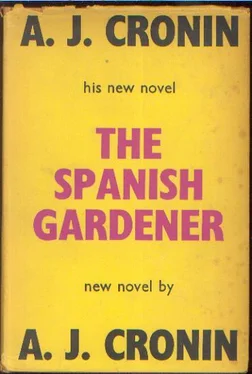Archibald Cronin - The Spanish gardener
Здесь есть возможность читать онлайн «Archibald Cronin - The Spanish gardener» весь текст электронной книги совершенно бесплатно (целиком полную версию без сокращений). В некоторых случаях можно слушать аудио, скачать через торрент в формате fb2 и присутствует краткое содержание. Жанр: Классическая проза, на английском языке. Описание произведения, (предисловие) а так же отзывы посетителей доступны на портале библиотеки ЛибКат.
- Название:The Spanish gardener
- Автор:
- Жанр:
- Год:неизвестен
- ISBN:нет данных
- Рейтинг книги:4 / 5. Голосов: 1
-
Избранное:Добавить в избранное
- Отзывы:
-
Ваша оценка:
- 80
- 1
- 2
- 3
- 4
- 5
The Spanish gardener: краткое содержание, описание и аннотация
Предлагаем к чтению аннотацию, описание, краткое содержание или предисловие (зависит от того, что написал сам автор книги «The Spanish gardener»). Если вы не нашли необходимую информацию о книге — напишите в комментариях, мы постараемся отыскать её.
The Spanish gardener — читать онлайн бесплатно полную книгу (весь текст) целиком
Ниже представлен текст книги, разбитый по страницам. Система сохранения места последней прочитанной страницы, позволяет с удобством читать онлайн бесплатно книгу «The Spanish gardener», без необходимости каждый раз заново искать на чём Вы остановились. Поставьте закладку, и сможете в любой момент перейти на страницу, на которой закончили чтение.
Интервал:
Закладка:
"Yes, señor."
Under the butler's level stare, the brows raised in arch interrogation, yet the eyes so expressionless as to be almost inhuman, Brande felt himself flinch. For the first time he sensed in that opaque gaze a vague derision masquerading as servility. Was it true, then, what Nicholas had so often and so timorously asserted? A flood of doubts, of suspicions hitherto undreamed of, rushed into the Consul's mind, sending a deeper wave of confusion across his beset and brooding brow.
"Garcia," he said again, resolutely, "I wish to speak with you."
The man bowed, too low by far, the very caricature of an obeisance. Brande gritted his teeth.
"When did you arrive back with the car?"
"At five o'clock, señor."
"But Professor Halevy left at eleven." Brande effected to consider. "Allowing two hours for your journey home you should have been back at one."
Garcia's eyebrows lifted a trifle higher.
"One must eat, señor," he answered sardonically. "It was necessary for me to partake of a modest, a frugal repast."
"So you spent four hours over this modest repast?"
"I did not realize that there was need for haste. And I found it pleasant to prolong my luncheon."
"Did you drink during this prolonged luncheon?"
"Señor?"
"I have been watching you carefully during the past hour. It occurred to me that you had been drinking."
The butler's mouth drew down sharply at the comers. For a moment his look was deadly; then a glint of contemptuous mockery, of careless malice, flashed in the depths of his clouded eye.
"I am a human being, señor, and must take advantage of my opportunities. Frankly, I am accustomed to good wine. When I was with the Aosta family in Madrid I was served with the best Marsala."
The Consul bit his lip sharply.
“You are very fond of referring to these Aostas. When were you with them?"
Garcia answered indifferently, with suppressed insolence:
"Some time ago."
"When?" repeated the Consul in a firmer tone.
Now indeed a perceptible change came into the butler's hooded eyes, a filming of the pupils, as though mud had been stirred up in their depths, creating a screen beyond which one could not penetrate.
"It is written in my papers," he said slowly. "They are all in order."
"Of course," said the Consul in a strange voice. He paused for an instant. "And you have never heard of an individual named Rodrigo Espantago?"
The butler's fleshy eyelids flickered once. His features, graven to immobility, seemed to solidify. There was a strange thickness in his voice as he replied:
"Why should I know of such a one? Who is he?"
"A criminal," Brande answered. "Wanted by the Madrid police."
A bar of silence throbbed within the room. Garcia's face was deeply congested, his nose and cheeks suffused by a fine reticulation of purple veins. And suddenly he burst out, incoherently, through his swollen lips:
"Really, señor, I feel myself insulted. What do you think I am, to hurl such insinuations at my head? Is it my fault if I have made enemies? No, señor, a thousand times, no. And always I have found a way to confound them, these sneaking brutes!" He was almost shouting now. "I spit upon them."
"Be quiet, Garcia," Brande exclaimed sternly, concealing his alarm.
"I am used to persecution," cried the butler, growing more and more excited. "I am a remarkable man. Often, when passing strangers in the street, I have heard them murmur: 'He is distinguished … of noble blood.' Bah, it is nothing, I am not proud. But am I responsible for the envy I excite amongst these others? There must be an end to it some day. Otherwise life becomes impossible. No man can continue to give everything and receive nothing. A meaningless sacrifice to which I will never submit …"
"That will do."
Brande, in his concern, half rose from the table, but suddenly the butler's eyes were emptied of all light. A slight shiver, almost a convulsion, passed over him. He breathed heavily, then drew the back of his hand across his lips to wipe away the white froth which had gathered there. A moment later, he glanced sideways towards the Consul. His manner was calm again, obsequious and ingratiating, yet in his voice there hung a veiled and subtle menace.
"Obviously someone has been slandering me. But I think I have always given satisfaction. Is not that correct, señor?"
"Of course," the Consul muttered.
"I am glad you are satisfied, señor. In that case it should be easy to forget these foolish notions. Surely you have already had enough trouble in your household?"
There was a pause. Brande drummed his fingers on the table, unsatisfied, resentful, and ill at ease, yet strangely unwilling to press the issue further. When he spoke the words came almost diffidently.
"You can assure me there is no truth in these … these suggestions?"
"None whatever, señor. Let your mind be at rest. I shall get more papers from Madrid. In a few days, I can give you all the proof you require." Garcia showed his tobacco-stained teeth in a confiding, chilling smile. "And now, señor, have I your permission to clear the table?"
"Yes," said Brande heavily. "I have finished."
He went out of the room and slowly climbed the stairs, hesitated for a moment on the landing, then entered his bedroom—where he stood, staring ahead of him, in deep tormented thought.
It was enough, he told himself, that Garcia had denied the accusation. For his own part, he had not faltered in his duty: he had placed the matter squarely before the butler, questioned him closely, and been reassured. What more was there to be done?
And yet, at the back of his mind, there lurked the horrible certainty that Garcia was indeed the man sought for by the police. His behaviour during the interview had been so strange—unbalanced was the only word which fitted it—and his last smile, placating yet cunning, so charged with baleful complicity it gave the lie to all his protestations, and fatally betrayed him …
Brande felt his head reel, like a mountain climber who, suddenly confronted by a precipice, is unable to advance or retreat. Yet advance he must; he had gone too far to draw back. All his forces were focussed, concentrated now in flaming incandescence, upon the prosecution of José. Any steps which he might take against Garcia must delay, perhaps defeat, this main objective. No, no, further investigation of Garcia must be postponed until José's case was settled. After all, the butler had promised to produce proofs of his identity within the next few days. It was only reasonable to afford him this short space of time to do so. Then, if everything was not in order, measures could be taken to secure his prompt removal.
Thus Brande argued, with frowning, feverish obstinacy, closing his mind to the fact that if Garcia should be all that was suspected of him then José, almost certainly, was innocent. Blind and deaf to reason, he shut out all externals—the matter was settled, his final decision had been taken, and he now awaited the approaching moment of fulfillment.
Chapter 20
WEDNESDAY came still and humid, filled with immense, opalescent sheets of light. Out of the grey and glassy sky a soft heat poured silently, in unseen waves which failed to stir even the thin, motionless leaves of the mimosa trees. The long fronds of the tamarisks fringing the lane hung limp and drooping, like the tongues of thirsting beasts. Sounds travelled from afar, vibrated upon the ear, as from the strumming of some gigantic harp. At the Casa Breza the hum of the distant town was unnaturally clear, yet oddly muted. Only the rasping of the cicadas broke the inexorable stillness, insatiable, interminable.
This queer, impenetrable day seemed to match the Consul's mood, which, from the moment of his rising, was set and gloomy. Since he had taken his decision two nights before, he knew that there was no looking back and his mind was firmly fixed upon what must inevitably come to pass. Yet his strange depression would not lift.
Читать дальшеИнтервал:
Закладка:
Похожие книги на «The Spanish gardener»
Представляем Вашему вниманию похожие книги на «The Spanish gardener» списком для выбора. Мы отобрали схожую по названию и смыслу литературу в надежде предоставить читателям больше вариантов отыскать новые, интересные, ещё непрочитанные произведения.
Обсуждение, отзывы о книге «The Spanish gardener» и просто собственные мнения читателей. Оставьте ваши комментарии, напишите, что Вы думаете о произведении, его смысле или главных героях. Укажите что конкретно понравилось, а что нет, и почему Вы так считаете.












